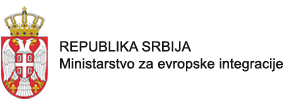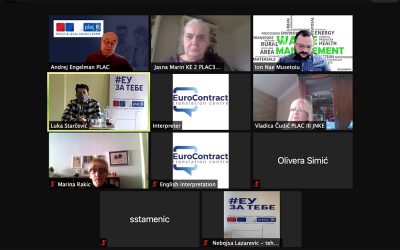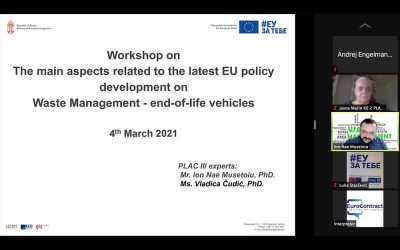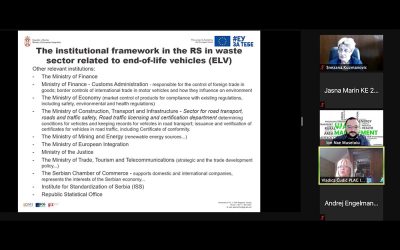Waste management: transposition of the Directive on end-of-life vehicles
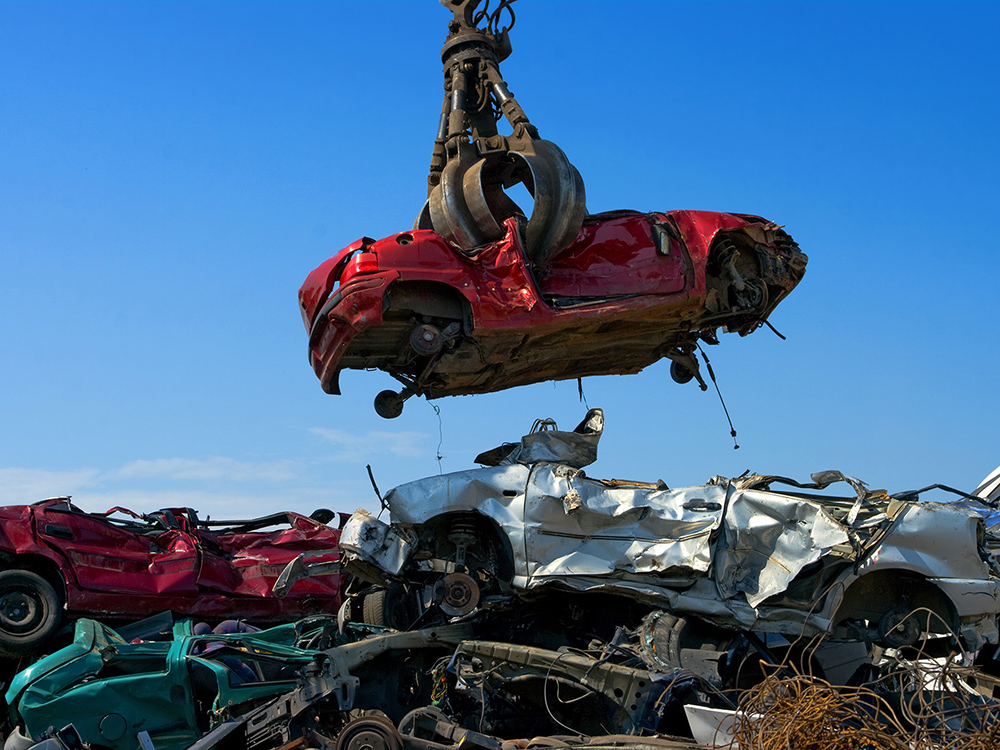
The Union acquis in environmental protection is constantly being improved, which obliges candidate countries including Serbia to follow these changes and introduce them in national legislation frameworks. Serbia is intensively preparing for negotiations with the EU on Chapter 27. The PLAC III project has provided support to the Ministry of Environmental Protection in transposing Union acquis in the field of end-of-life vehicles, which are declared as hazardous waste and are one of the causes of environmental pollution.
At the workshop held on March 4, 2021, PLAC III project expert Ion Nae Musetoiu presented the relevant EU legislation framework, which, as he said, is constantly being improved in accordance with technological progress. The main document is Directive 2000/53/EC on end-of-life vehicles (ELV), the latest consolidated version of which was adopted in March 2020. The Union acquis includes also Directive 2018/851 amending Directive 2008/98/EC on waste, as well as three European Commission decisions – laying down detailed rules for monitoring of the reuse/recovery and reuse/recycling targets, establishing component and material coding standards for vehicles and on minimum requirements for the certificate of destruction of end-of-life vehicles.
The legislative framework applies to motor vehicles of type M1 (up to eight seats) and H1 (motor vehicles up to 3.5 tons). The objectives are minimising the environmental impact of ELVs and ensuring proper functioning of the internal market (and avoid distortions of competition). Vehicle producers are obliged to design more recyclable vehicles, to limit the use of hazardous substances while some of those are completely banned, such as lead, mercury, cadmium and polyvalent chromium. They are also required to issue a certificate of destruction to a final ELV owner. The collection of waste generated by the shredding of end-of-life vehicles should be carried out in the designated places, for which the economic operators are responsible. Waste vehicle treatment companies must be licensed by the appropriate authority, and should achieve reuse, recovery and recycle targets in their work.
In Serbia, the area is regulated by the Law on Waste Management, the Rulebook on the manner and procedure of ELV management and the Decree on products which become special waste streams upon their use. As the legal gap analysis showed, the ELV directive has been partly transposed into legislation through the Law and Rulebook, Musetoiu said. It is necessary to amend the Law in order to achieve full transposition and provide legal basis for secondary legislation with specific provision, he added.
Project expert Vladica Čudić presented a detailed analysis of the situation in the sector in Serbia, where the average age of vehicles is 17 years, and as much as 78% of the total market in 2019 accounted to used vehicles. Recommendations for improvement are strengthening the administrative capacities of the competent authorities, introduction of financial incentives for the final owner of the vehicle to hand it over for waste and a mechanism for paying taxes for those who do not respect that obligation. It is also recommended to introduce extended producer responsibility for the collection, storage and recycling of ELVs, as well as a landfill fee related to the shredding of residues that are disposed of as unusable. According to Musetoiu, it is necessary to introduce a provision on extended producer responsibility in the Law on Waste Management, while for regulating the responsibility of economic operators, which should be given subsidies is recommended that changes be introduced through bylaws. Musetoiu also presented possible economic instruments for financing the management of end-of-life vehicles as waste, such as the financing of incentives for the management of ELV waste for a period of 3-5 years, after which the work schemes become self-sustainable.
Relevant EU legislation:
- Directive 2000/53/EC on end-of-life vehicles
- Directive 2018/851 amending Directive 2008/98/EC on waste
- Commission Decision No 2005/293/EC: laying down detailed rules on the monitoring of the reuse/recovery and reuse/recycling targets set out in Directive 2000/53/EC
- Commission Decision No 2003/138/EC: establishing component and material coding standards for vehicles pursuant to Directive 2000/53/EC
- Commission Decision No 2002/151/EC: on minimum requirements for the certificate of destruction issued in accordance with Article 5(3) of Directive 2000/53/EC
Photo gallery
Recent Posts

Notice
9. April 2024.

The fourth project brochure published
29. March 2024.

The last meeting of the Steering Committee
28. March 2024.
Negotiation chapters
- Chapter 1: Free movement of goods
- Chapter 3: Right of establishment and freedom to provide services
- Chapter 8: Competition policy
- Chapter 9: Financial services
- Chapter 10: Information society and media
- Chapter 11: Agriculture and rural development
- Chapter 12: Food safety, veterinary and phytosanitary policy
- Chapter 13: Fisheries
- Chapter 15: Energy
- Chapter 16: Taxation
- Chapter 27: Environment
- Chapter 28: Consumer and health protection
- Chapter 32: Financial control
- Chapter 33: Financial and budgetary provisions
